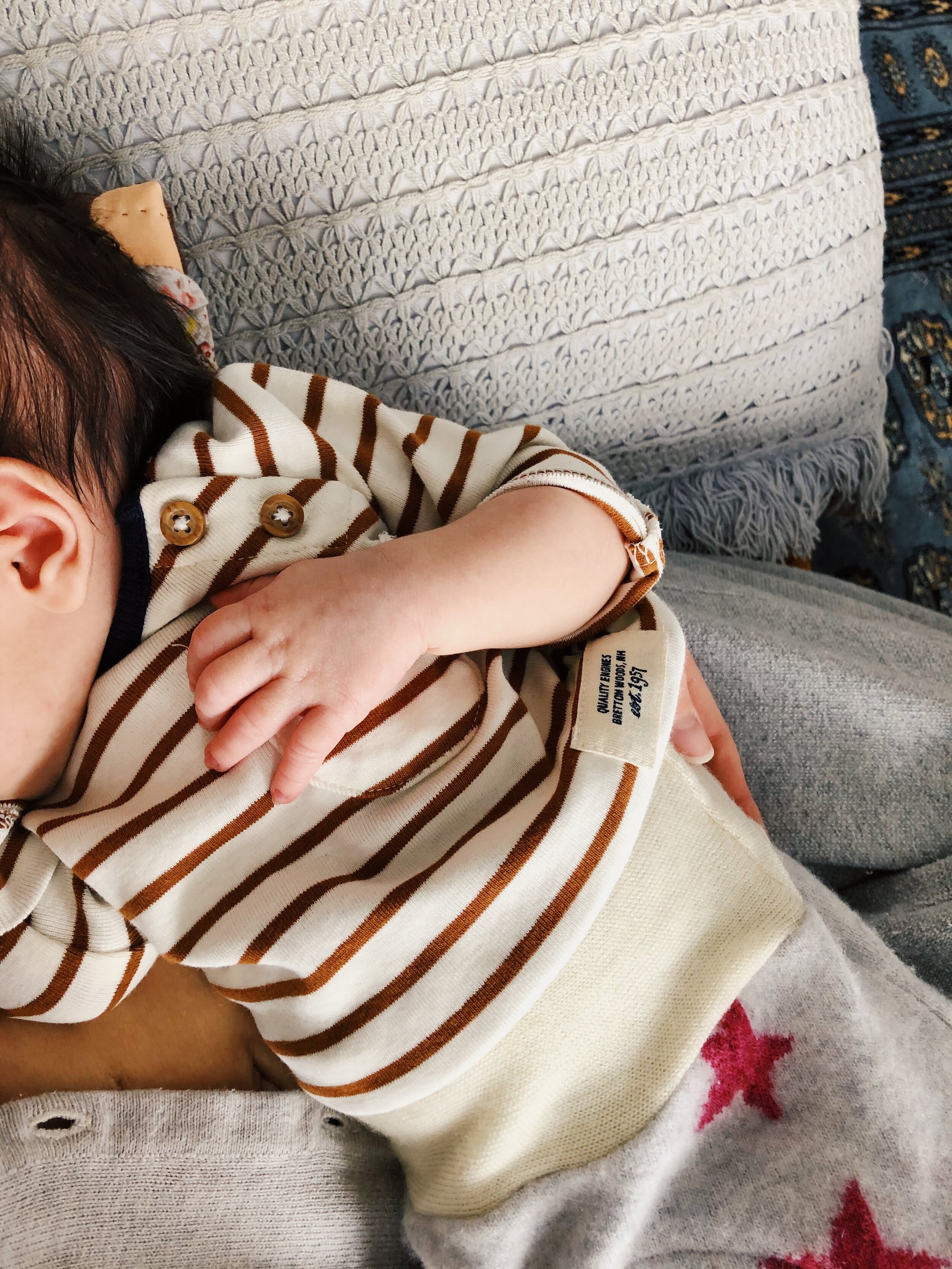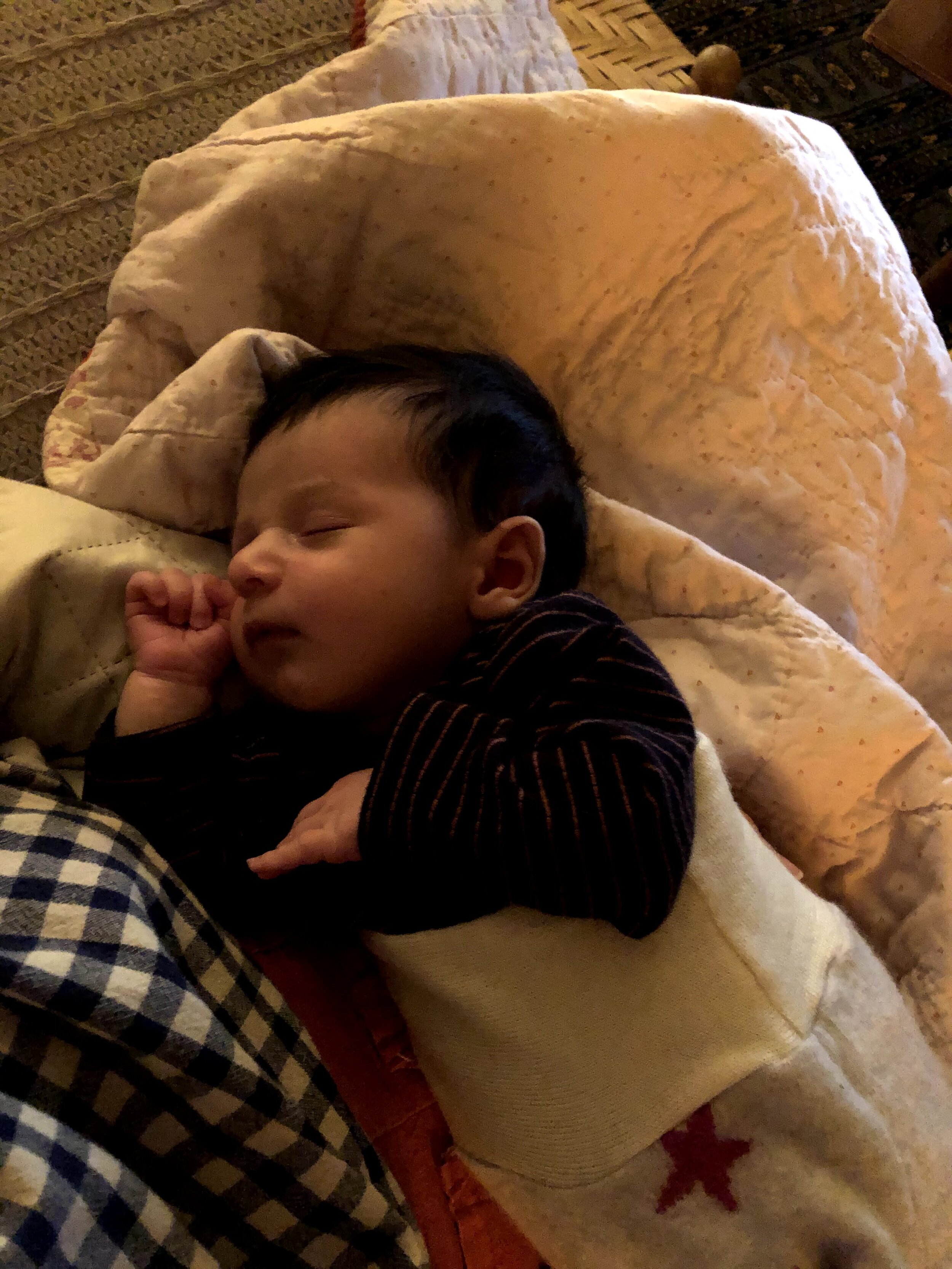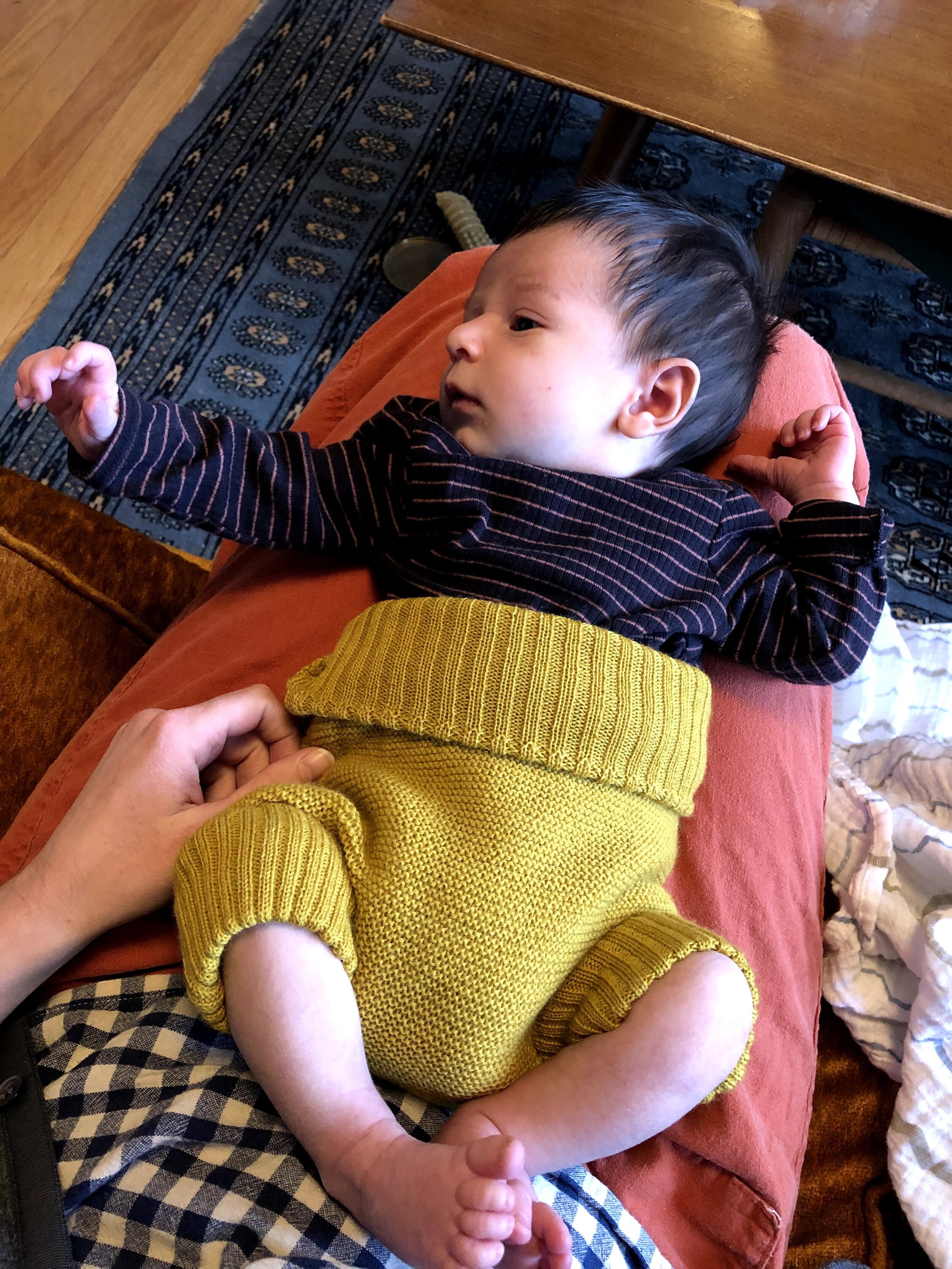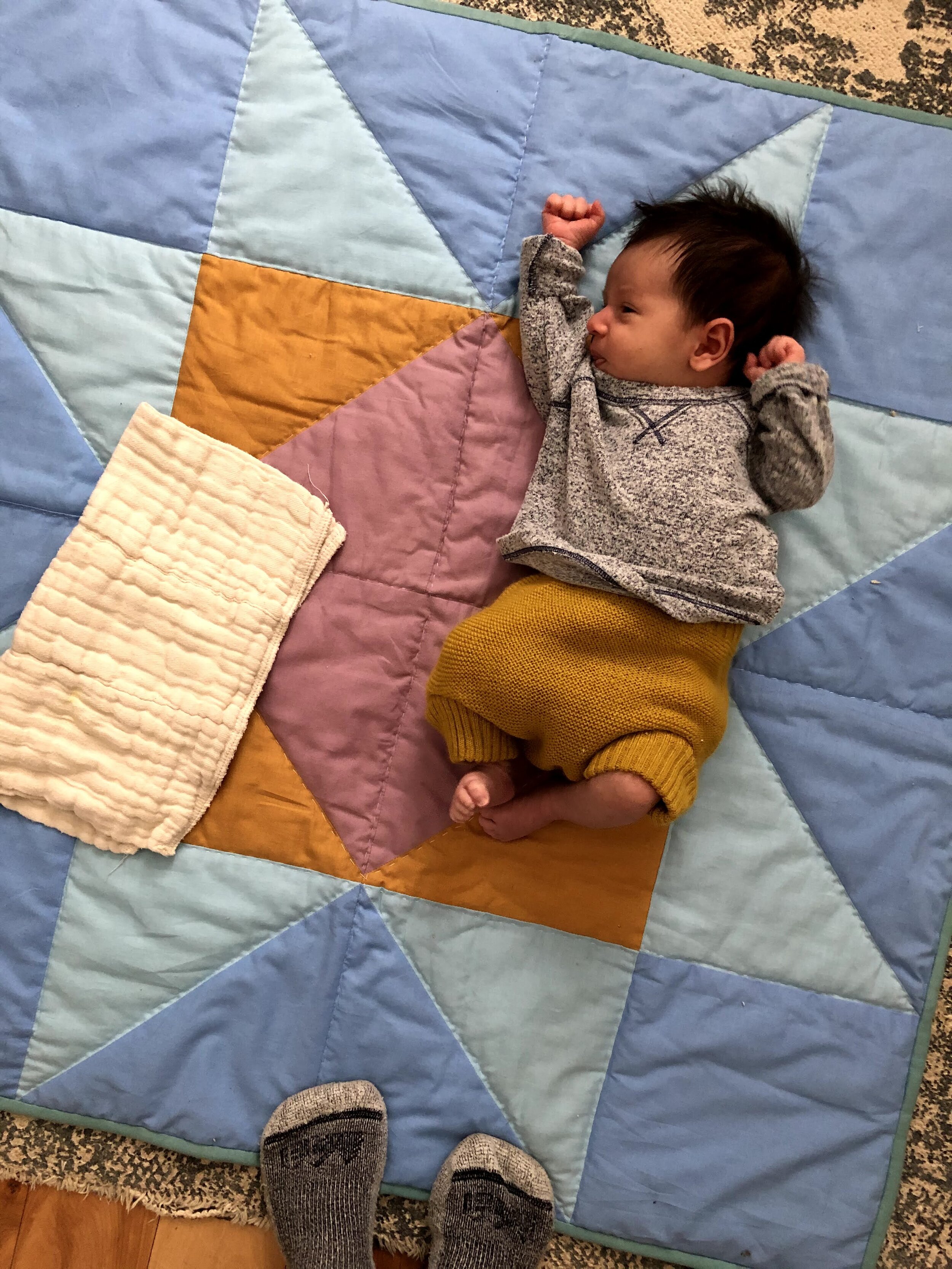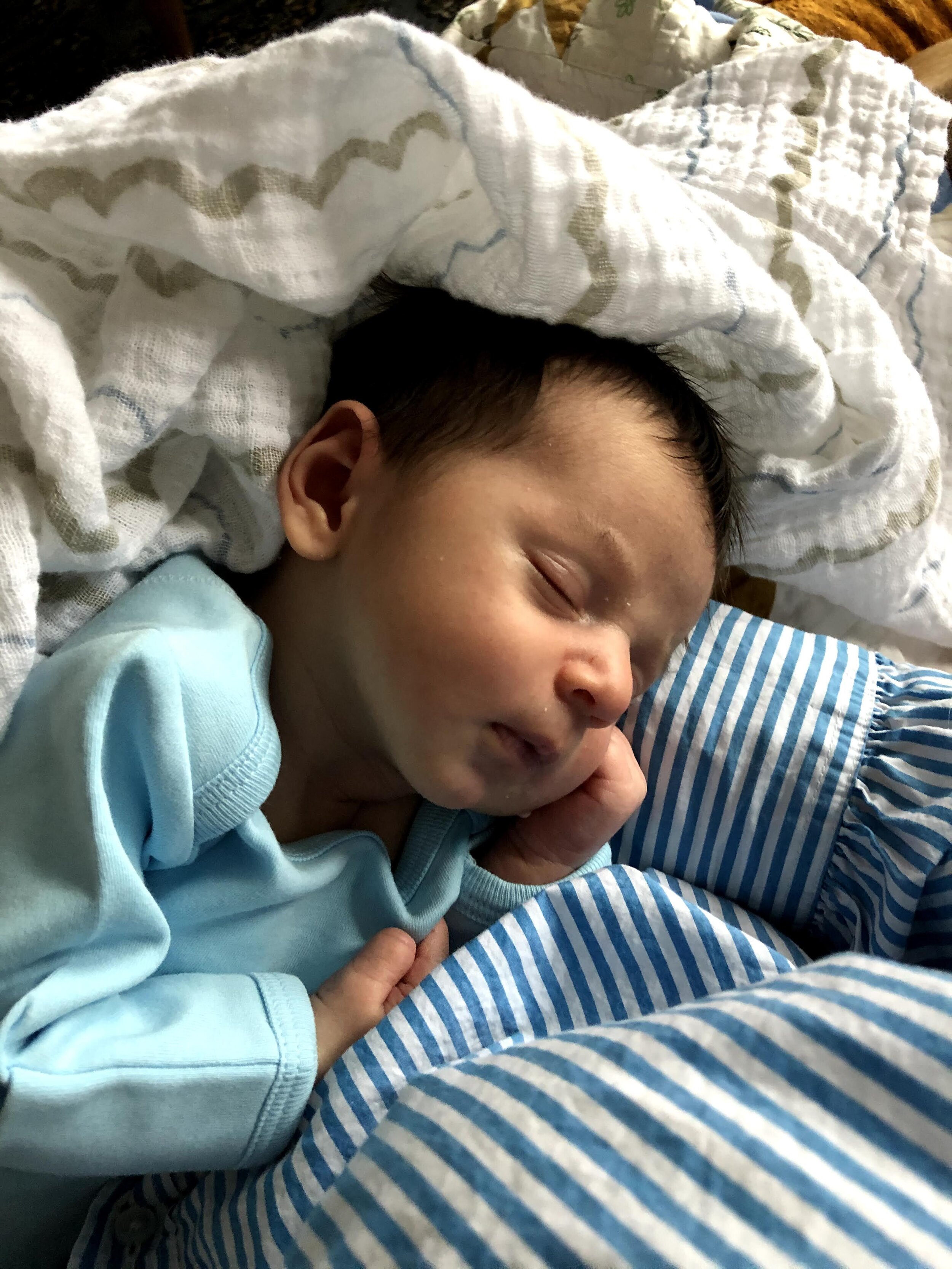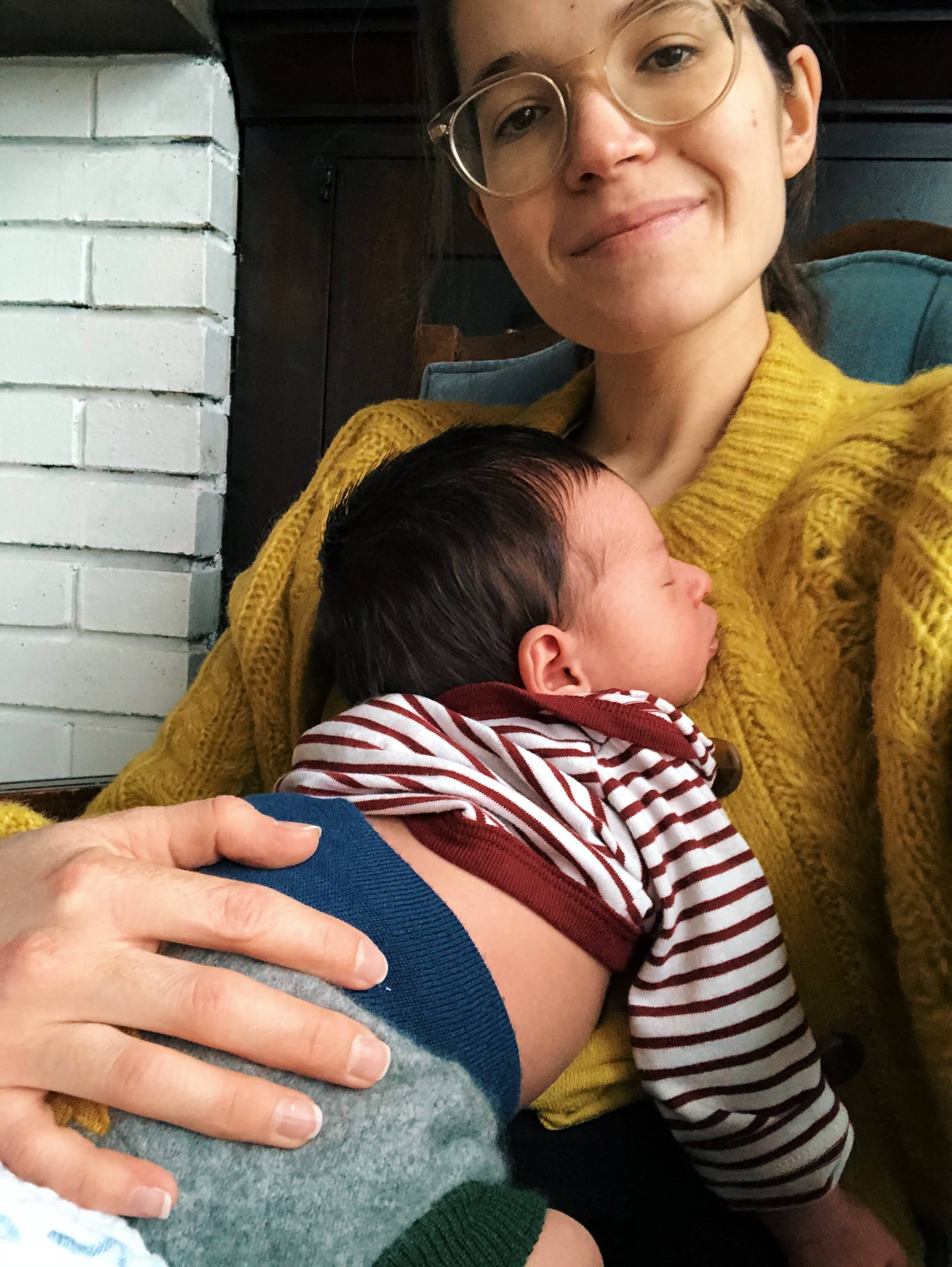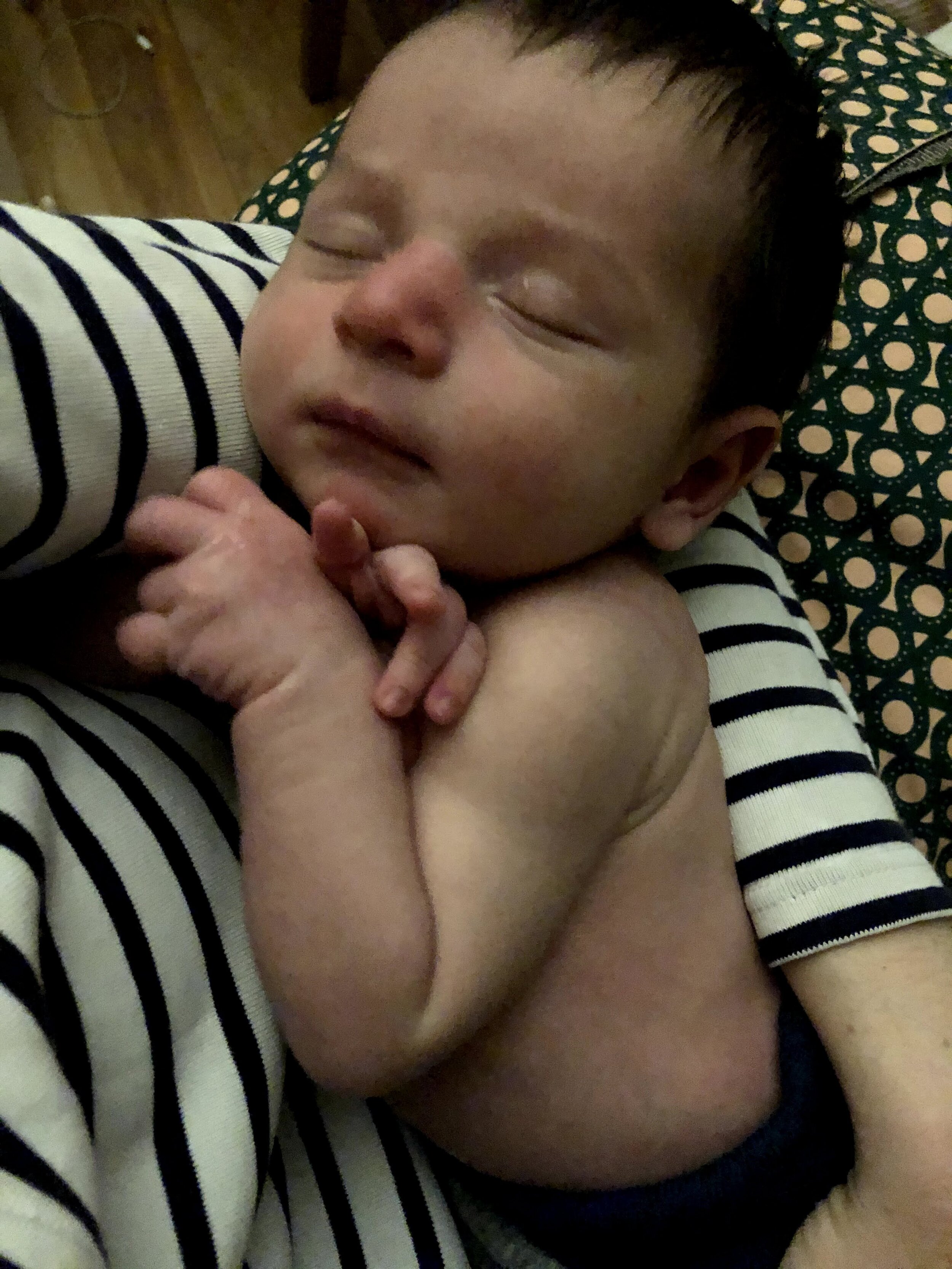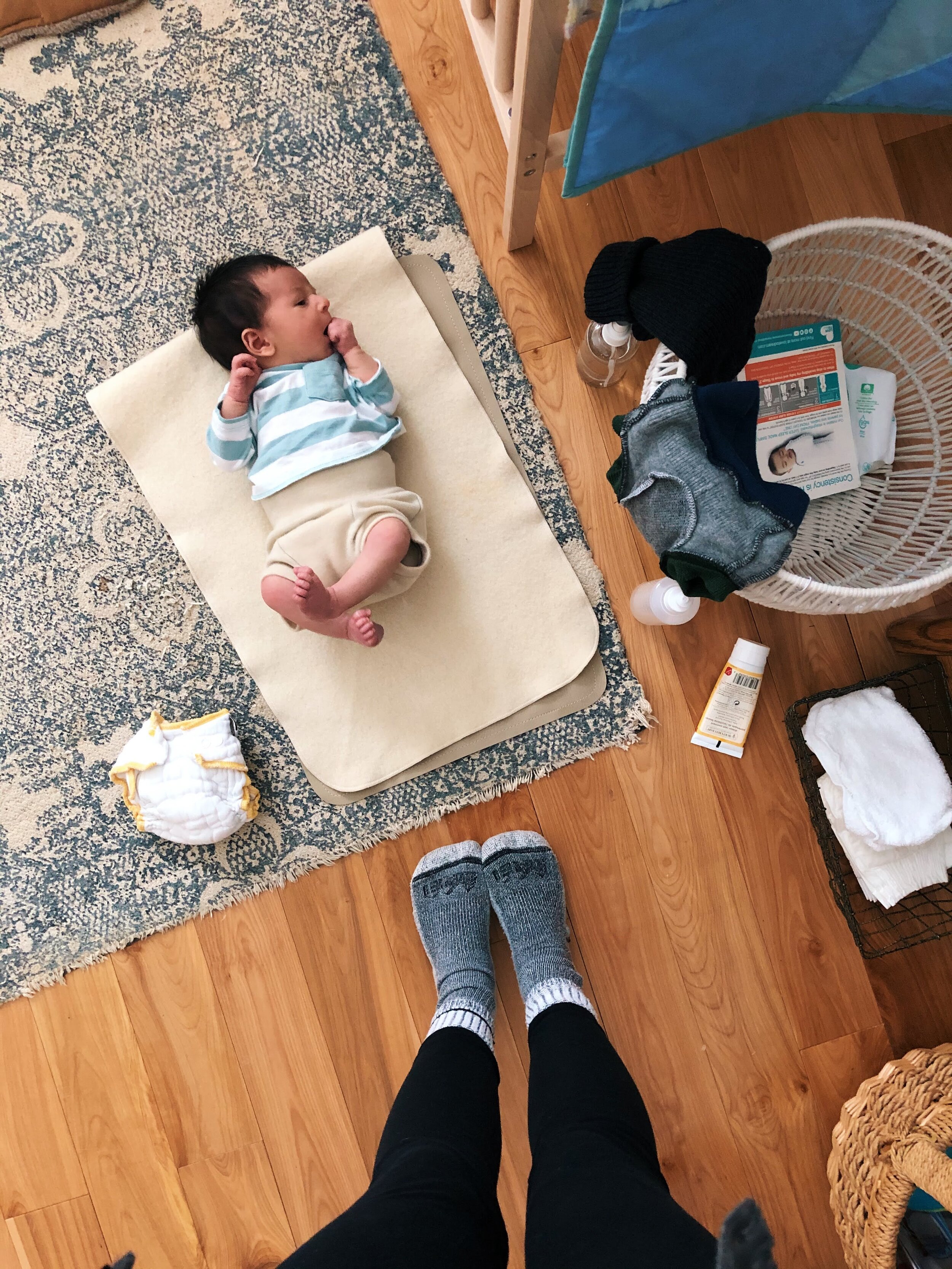this island
We had a hard night last night. We’ve had a hard night every night, for one reason or another. Thomas, Tommy, is 16 days old today. Last night, he slept great in his bassinet for the first 2.5 hour chunk, then we woke him up past midnight to eat and be changed and for me to pump (always pumping), and he wouldn’t go back to sleep. It wasn’t until we gave him another ounce of breastmilk in a bottle over an hour later (terrible hour of crying, wanting sleep), that we got him to fall asleep on the flat expanse of sheet between us in bed. Not the desired place, not the desired time. Half a dozen attempts in various permutations before that – bassinet, change diaper again, rock in rocking chair then put him down again so gently, rest on dad’s chest a while, make sure dad doesn’t fall asleep like that, half-heartedly breastfeed, mom cries, dad gets frustrated, another diaper change, etc. That hour felt like utter chaos, no plan, no idea of what might work. I forgot soothing. I forgot everything. I feel, in those moments, in the middle of the night, my baby screaming in my arms no matter what I do, like a total failure. If my holding him close in the dark can’t ease his pain or fear or exhaustion, what could? Who will ease my pain and fear and exhaustion? What am I supposed to do?
Then, a miracle, he falls asleep and I do too, though not without the acute fear that he will stop breathing or die while I’m not watching his chest rise and fall. I wouldn’t even describe myself as really experiencing postpartum anxiety in any clinical sense, but this fear still sits at the front of my mind no matter how carefully I try to logic it away. Does every mother think such morbid thoughts – is it instinctual to imagine your baby’s death at every turn so as to be able to hopefully preemptively prevent it? Somehow I close my eyes and stop watching. I suspend my disbelief. I hope beyond hope. I study his position, think about whether it’s possible for him to flip over or lodge his face against something, anything, that could suffocate him. Anything is possible. But he is as safe as he can be. We are as safe as we can be. We are doing all we can. Nothing is perfect at all.
I was the sort of pregnant woman who swore (in my mind) that I would never put my baby in a compromising sleep situation – and now I’ve already broken every rule in the book. I’ve accidentally fallen asleep with the baby flung across my chest, I’ve let the baby sleep in the special pillow that says clearly “not for overnight or unsupervised sleep,” I’ve bed-shared more nights than not, letting Tommy sleep on his side because it’s the way his body is naturally shaped. I’ve held his tiny hands all night, which breaks no rule but still feels somehow like it isn’t what you’re supposed to do.
I spent so many anxious hours in my pregnancy researching bassinets, making sure that what we had was appropriately safe. It’s almost hilarious now, given how rigorous my research was, to know how different the reality is than the imagined life with an infant. The marketing all shows angelic babies sleeping soundly – in their vibrating bassinet, on their crib sheets, in their not-safe-for-sleep pillow, in their $79 weighted swaddle sleep sack. They don’t tell you that you’ll break your own rules. They don’t tell you you’ll desperately spend way too much money on way too many gadgets, and most of them won’t work. They don’t tell you that what is most important is to know the rules in the first place, that knowing them at all makes breaking them a little safer. The guilt alone is enough to make you keep trying to do the safer thing, night after night, to not settle into passivity. You keep putting the baby in the bassinet. You keep listening to him scream. Maybe one night it will work? The baby’s job is only to keep changing and changing and changing.
Maybe I am wrong to admit these small failures. Maybe already you will mistrust my judgement, withdraw your benefit of the doubt. But what good is a dishonest account?
That I’m sitting here typing now is due to the small miracle of grandparents, Isaiah’s mom and dad, who quarantined for two weeks to come see Tommy. Their delight in him is infectious. I am relishing my time alone in my body. But I also feel a strange pang of jealousy anytime anyone else holds my baby. And a strange nostalgia for when he was one day old, two days old. And a strange desire for time to speed up, for him to be better at sleeping, at holding his own head up. I want everything at once, every wanted thing strange.
What did I used to want? What was ordinary like?
Tommy is beautiful. He has so, so much dark hair. His skin is softer than rabbit’s fur, which always felt to me like the softest thing. He is tiny and still all curled up and frog-like, so much that I can see now so much more clearly how he must have been positioned in the womb in those last weeks – his back toward my left side, his head down low in my pelvis, shoulders tucked within the curl of my left hip, his bottom up high, squishing my stomach, and one of his feet often gently prodding my right ribs. I would touch that foot so often. Now I still touch it often, but differently. Sometimes he stretches out his legs and he is astonishingly long – but only for a moment. He coos, makes small sounds. He likes to position his mouth in a tiny “o” sometimes, my favorite face he makes. Sometimes he waves his arms very slowly in the air like he’s doing tai chi. He’s incredible. And he terrifies me.
I expected all of this to be very difficult. Pregnancy, Birth, New Parenthood. I expected to never know what to expect. I expected overwhelm, fear, anxiety, sadness. I expected hard work. I couldn’t imagine any of the details, and they have been appropriately surprising at every turn. I didn’t know how much I would bleed, or how strange my uterus would feel even past two weeks postpartum. I didn’t expect the waves of fatigue, the sudden wooziness that one time at the pediatrician’s office. I had no idea how breastfeeding would feel – and having absorbed so many people’s reports that breastfeeding was really tricky and difficult, I approached it with some self-defensive tenuousness. Should I have been more confident? I’m not sure it would have helped.
I didn’t know how anything would feel. I didn’t know how I would react. But I did expect to be taken over, swept away, and that expectation has held true. I ride atop that expectation like it’s a life raft. This is a huge thing, I keep telling myself. It’s supposed to be exhausting, it’s supposed to be chaotic. Knowing this and accepting it doesn’t make the hours more simple though. Especially as more and more days pile up, the time moving both quickly and molasses slow, I begin to feel a deep sense of isolation set in. I call postpartum an island, I declare myself stranded on it. It’s a beautiful island. There are moments of elation. The sunset, the ocean, the shades of green. But also I’m stuck here. No easy way off the island. With the terrifying nights, the exhaustion of survival, the constant problem-solving, the learning my way around. And the never knowing when I will be rescued — the realization that to leave this island, I may have to build a boat. Or build a house and live here, make this island my home.
Labor and giving birth unmedicated felt like that dream-state of reacting in a crisis. I’m pretty good in a crisis. I keep my head. I did keep my head, but not my body. Labor is a freight train, it keeps going and going whether you’re hanging on or not. I heard someone describe it once like this: it’s like you’re an ordinary passenger on an airplane and suddenly someone asks you to land the plane. That feels right.
Labor was incredibly difficult. My early labor began on my due date and was long and relatively mild, but when things picked up they really picked up. Right before leaving for the birth center, we strangely watched Two Weeks Notice, with Sandra Bullock and Hugh Grant. I endured terrible contractions throughout the movie, really couldn’t tell you very much about the plot, but it was pleasurably distracting and at times even funny. I laughed between rushes of pain. I was also very distracted by fear — what was about to happen to me? What had already begun? As soon as the credits rolled we gathered up our things.
Once we were at the birth center, I felt very serious and acutely aware of time passing quickly but not quickly enough – wondering how I was progressing, worried I wasn’t progressing, afraid that I would get trapped somewhere and… maybe die? I didn’t know what the outcome would be if things weren’t moving along. I managed some contractions well, breathing deeply and carefully. But many of them knocked me over. Many of them felt like drowning. I remember feeling self-conscious about how I might have seemed to the midwife and nurse. I remember feeling sometimes disappointed in myself. At one point, in the disco bathtub, shortly before my water broke with the strangest pain then pop (in the tub, no mess!), I remembered something from Ina May’s book about some women describing labor as painless or even orgasmic. In the next contraction, I asked myself – “is this painless? is what I am feeling actually pleasurable?” My answer to that question was: NO NO NO NO NO. This is pain. This is suffering. This is really, really hard.
To say that honestly and definitively, even just privately, for myself, was actually sort of a relief. I didn’t have to like giving birth.
The funny thing about labor, like so many other things (color, sound, smell, pain in general), is that you can’t know if it feels the same for anyone else. Do you see blue the same way I do? Would birth feel this way for you. When someone says it was painless, were they feeling the same things as me? What’s different about us? How can we share what we felt? I remember a moment of thinking about this while in labor, standing alone under the shower’s hot water for over an hour.
Transition came and went really quickly, before I knew it – which is good because I remember having the thought: “if it gets much worse than this then I don’t know what will happen to me.” That was transition. I was finally using Nitrous Oxide and wondering why I felt no relief at all – it’s because relief isn’t possible in transition. Nothing is possible in transition. Then the unmistakable urge to push, like the tide pulling in. I pushed for almost two hours. I screamed crazy screams. I had to learn how to push effectively, which felt like a cruel trick that there was technique involved.
The midwives hovered around me. They talked to me, and waited with me. Touched my knees and legs. Isaiah was always beside me, at my right hand. But I was alone. I was actually sort of pleased with my intuitive decision not to hire a doula after all — my pain felt private, personal, and I knew all along that I would mostly want to deal with it quietly, in solitude, on my own.
Overall, it was a very safe and straightforward birth. My whole pregnancy was safe and straightforward. Nothing was unusual. Nothing was out of the ordinary. The only thing that made it special was simply that it was happening to me. I have no crazy birth story to claim. No dramatic ending. The most dramatic thing that happened was my episiotomy – Tommy’s heart rate was dropping after he was crowning for a while, so the midwife said, “We need to get him out on the next contraction, and the easiest way to do that is to do an episiotomy. Are you okay with that?” and I said, “yes, yes yes!” – which was performed without pain relief but was definitely not more painful than the sensation of “ring of fire” and crazy pressure I’d already been feeling for the past fifteen minutes.
No nothing crazy, just crazy because it was mine. It felt crazy to me. Everything new. Everything wild. The midwife wrote in my chart, “Amy had a long early labor. Once active, she labored with grace and progressed beautifully to a vaginal delivery. Loving support by Isaiah.” It felt good to read that a few days afterward. She also said as she stitched me up and I was holding Tommy on my chest that I had a “very strong perineum” – that made me feel a funny rush of pride too. Perineum pride!
Labor was so hard, but I never felt lost in it. I never really felt like a failure. I was along for the ride. I had to make very few choices. I could trust the process and my body and the people helping me. I only had to survive. I only had to not quit. I didn’t even have to do it gracefully, but of course I wanted to. Once I had my baby, once he was out, I had succeeded completely, finished the task. And the new task was beginning. All my arms and legs felt like noodles, and they were asking me to hold a slippery writhing baby, get him to latch on my breast. I could hardly hold him, needed help moving him around. Already I felt overwhelmed, so exhausted. And so happy. I wanted to keep being so, so happy. I wanted to rest in the happiness, sleep in it, stand very still. Obviously that’s not how it goes.
When Tommy was born, I shrieked, and then I laughed and laughed.
And then a few hours later I was supposed to walk to the bathroom and pee, and it was almost harder than giving birth, standing up and walking.
You really do have to learn how to take care of a newborn. It is not simple or even natural, even for a person who has cared for babies quite a bit before. I was a long-term nanny for two separate infants, so I was not unaware of the way it feels to perform all of these tasks over and over for days and days in sequence. But it’s different when it’s your kid. It’s different when you birth them and they’re placed on your chest. It’s different when it’s 24/7 starting at hour zero.
We took a “newborn care” class. I read multiple books. All of it felt aggressively unhelpful, mostly because I could feel myself absorbing almost none of the information that all felt critical. That all is critical. Each piece of newborn care is important – especially feeding and sleeping, which are both the most complicated of all. It’s so easy to miss things. It’s also so easy to misunderstand or read false information from an ill-fated google search. There’s too much out there, and lots of it is contradictory. I’m deeply grateful each time a trusted person says, “read THIS book, try THIS thing”, because otherwise I’m spending all day researching what to do instead of doing things. You have to learn! It takes days! There’s a lot of crying for everyone involved! I literally can feel how my arm muscles aren’t strong enough yet to move my baby around in the way I would like to. That is so frustrating. I know they will get stronger as time goes on, but I want and need that strength now. The process is tedious and slow. Each muscle will get stronger, we will learn what we need to know, but slowly, slowly, not all at once. I wish sometimes it were all at once. The books make you feel like it should be all at once. They don’t tell you that you’ll mess up at least half of the things for a while and feel like a bad mom. You can’t ace the final exam without absorbing the information first over the whole semester.
It takes time. Time time time. I am made of new time, and time is made of Tommy.
And still, we are alive.
Is there help for anyone? Even with more adults in the house, the arrival of the grandparents, I find myself unable to describe the tracks of routine I’ve already begun laying down, the way I do things. The interior of my mind is garbled and incommunicable. Cloth diapering, the washing of pump parts and bottles, the strange, specific baby schedule tracking I keep in an app in my phone. Even Isaiah isn’t privy to all my keeping track. It’s all in my mind alone, I don’t know how to pass if off. I fear that I won’t ever be able to – and isn’t that part of the woe of so many mothers, the false feeling of, “I’m the only one that can”?
In a lot of ways, I don’t know what to say. I’m not as lucid as I was when pregnant, not so easily able to make meaning or connect any of the dots. This is probably due to only sleeping in very short spurts for many days now, with many more to come. Probably also due to the chaotic sense of change that keeps tossing me around. I feel bruised, mind and body. I feel discontinued – that word came to mind while taking one of my witch-hazel-infused sitz baths to try to help heal my episiotomy stitches. My sense of ongoingness isn’t disappeared, but it is certainly altered.
I haven’t relaxed in the three weeks since Tommy was born. Since before then, really, because how can you relax when you’re at full term in a pregnancy? Just today, we are finally experimenting with paying close attention to Tommy’s wake windows and sleep cues and putting him down for consistent naps in his bassinet all day. I’m frustrated with myself, mostly because it’s working — why didn’t we try this before? Each time we find something that works, I feel upset that before finding the solution I’d inadvertently caused my baby and myself to suffer. A few days ago I discovered that Tommy’s poor sleep at night might have been due to the simple fact that he was COLD. I figured this out because I was wearing warm pajamas and lying under a down comforter and I was cold. Meanwhile, Tommy was only wearing cotton footie pajamas (since he has refused all swaddles from birth). My poor Tommy, fussing because he was freezing! Here, the admonition to not overdress a baby for sleep because it can make SIDS more likely steered me wrong – I tucked him into a random un-fancy old-school Carter’s fleece sleep sack with sleeves that my mom found for us secondhand before he was born, and he slept so soundly. But all those nights before I realized this solution, Tommy had been so cold, and so unable to tell me what was going on. And I was too tired or taking in too much new information to realize it and intervene on his behalf.
I know I shouldn’t blame myself. I know that now that we have fixed the problem, Tommy is truly no worse for the wear. But, still. How could I not feel badly about that? And about all the other things I’m surely missing. Why didn’t we try putting him down for consistent daytime naps in his bassinet before now?
Well, for a million reasons. Because we wanted to hold and cuddle him, get to know him. Because both sets grandparents quarantined for 14 days to get to spend time with him, so obviously they wanted to cradle him in their arms as he slept over the course of a week. And, because no one told me to. Or I read it somewhere once among too much other information, and it didn’t sink in. Or because all of my powers of deduction were being used to troubleshoot and research breastfeeding troubles, no time to worry about sleep, which was more or less happening, just quite haphazardly. He would fall asleep while nursing, or he was cluster feeding so not really sleeping but dozing, or he slept on Isaiah’s lap for an hour and we hardly noticed, or he was mysteriously fussy for an hour and wouldn’t sleep. I’m sure that he was overstimulated. I’m sure a good bit of the fussing from the last few weeks was due to his being overtired. But also, he did sleep. Also, he was okay. And now, this new solution is even better. But it’s okay to only have tried it now. It’s okay to not know something until you know it.
But that’s a big piece of the new shame that is finding me in motherhood – I want to know everything, approach each problem perfectly. Over and over, I fail. Of course I do. But the failure upsets me. I disappoint myself. It isn’t dissimilar to how I felt in labor – some contractions I breathed through, I managed efficiently and well, but others made me feel like I was drowning, took me deep under the water. The shame of those drowning contractions made me forget the pride of the ones I managed more positively. My disappointment in myself often made me forget that I was successfully giving birth unmedicated – doing exactly what I set out to do, what I hoped for. So much so that the midwife’s report, “Amy labored with grace” surprised me.
When will I relax again? Where will my safe harbor be? After giving birth, I only wanted to sleep, to retreat, to rest and be alone. Instead, I had to learn how to breastfeed, stand up and walk to the bathroom to try to pee, experience pain after pain, never be alone again. And so it has been for each hour since. And this is as it should be. I am doing exactly what I set out to do, probably with more grace than I am giving myself credit for. I am caring for my baby, keeping him and myself alive. I am feeding him, changing him, holding him, helping him sleep. I am loving and being loved.
But I have been flung from any center I’d had. I am careening through space. I have this pain in my shoulder that won’t go away. I am bleeding still, and sore. My eyes are dry and sunken. I am eating comfort foods that should be more nutritious. I put the baby back to sleep in the middle of the night and then can’t sleep myself. I feel like I am failing more often than I don’t. I can write that down – but how can I feel it? How can I celebrate that all along I have “labored with grace”?
I try to notice when I feel like myself, when I return to something like my center. The midwives tell me to take two daily witch-hazel-infused hot baths to help my stitches heal – these baths become something like a lifeline. I feel like myself in them. I listen to music, close my eyes, think thoughts that feel familiar to me. I mentally write half of this essay in the bath, use dripping fingers to jot down bullet points in the notes app on my phone. In the bath, sometimes I think I can hear the baby crying, and sometimes I actually can. Either way, I interchange between something like relaxation and returning to vigilance in fits and starts. I set a timer for 20 minutes and don’t get out of the bath until it goes off.
I don’t feel like myself when I’m with the baby. I don’t really feel like anything when I‘m with the baby. Raw love, sure, but right now, motherhood feels like a series of tasks, a movement sequence, choreography — a dance. A pat, a rub, a wipe, muscles straining to hold gently but firmly, no sudden movements, gliding from room to room. It’s partnering. I’ve been drawn to watching ballet documentaries, as many as I can get my hands on, in this immediate postpartum period, and now I’m seeing a connection.
I’ll be honest, though, that I am anxious about what I will find when the chaos subsides. Who will I be on the other side of this? What will that life be, our new ordinary? I’ll leave the island eventually, what then? Even now, with tiny incremental improvements in my understanding of how to take care of Tommy and what is required of me, I feel this pressing anxiety about my life. What is it? Where has it gone? Where is it going? Every future day is so utterly different from every past day now. They all have Tommy in them. Tommy needing me. Tommy wanting me near him. Tommy depending on me. It’s hard to imagine now that being a mother will become normal. It’s hard to imagine ordinary time from this heightened place I am in. What kind of ordinary mother will I be? What kind of ordinary life will I have? This period of time is a door I am walking through, a passage to somewhere new. I wrote in a poem, early in my pregnancy, “I want to be transformed.” Transformation is terribly painful, and often terribly slow. It leaves you in a middle place for a long time, somewhere uncomfortable and strange. I do want to be transformed. I was honest when I wrote that. But the action of it is so disorienting that here, in the middle, I want to crawl either forward or backward, get me and my baby out of this spot.
But he will never be this little again. Isaiah says that sometimes while he holds the baby on his chest, with a shocked tenderness that I rarely see from him. In the middle of this uncomfortable place is something so precious, so fleeting, so magical – this bird-like mystery, this newborn baby, still living halfway between earth and somewhere beyond. His appearance is different by the minute. I’m surprised when I look at photos of him (of which we’ve taken 10,000) – though he is so easily recognizable as mine, he also seems to shape-shift before my eyes, a hundred different babies in one. I would never wish this version of him away, his tinyness, his curled body and legs, the “o” of his mouth, his dark, dark eyes and hair.
I don’t want to be an angry mother. I don’t want motherhood to give me more edge, more bitterness. I feel the rage rising in me sometimes already, being passed to me silently from so many other silent women. In lots of the circles I’m in, I see lots of angry mothers. Motherhood has gotten some pretty bad press this year, what with the pandemic disproportionately laying the burden and labor of America’s children squarely on mothers, the social safety net dropping mothers through so many holes to freefall. I follow some brilliant writers who are mothers on twitter, and all of them are angry. Their anger has left an impression on me. I trust them, and they are saying what they see.
But, like I said, I don’t want to be an angry mother. Just like I don’t want to be an angry American or an angry Christian, but so often I am both of those things. Maternal anger is upsetting, but it’s also helpful. The clarity of emotion, of anger that is righteous but also softened by a resolve to continue. I read anger in the message boards, in the books, on social media. I see it in even the happy messaging, the beautiful images, the marketing. This is difficult. There are so, so many ways it could be easier, but those things don’t exist in the way that they should. More support, more gentleness – less products and more community. I’ve been thinking about a novel I read while pregnant, After Birth by Elisa Albert, where the main action of the plot is one mother with a one-year-old spending lots of time with another mother with a newborn, helping her in those early survival days by simply being present as a sounding board and companion. It’s a beautiful, sometimes difficult book, and an angry one. Reading it while pregnant, it didn’t quite hit me. It’s hitting me now. How radical that companionship was. How incredible it feels when other women do that for me. How I am clinging to my husband’s presence right now like a life preserver, like water wings. How at least once a day I feel sure that my life is over in one way or another.
Of course I will be angry as a mother. But I can also ask and keep on asking for a double-measure of peace, of abundance, of beauty. I don’t need to settle for anger to be the first and last experience, don’t need to swallow it like a bitter pill at the end of every day. It belongs. But joy belongs too, perhaps even more. I can want motherhood to be sweet.
I have questions for the universe. One is: “why is this so difficult? not just for me, but for everyone?” Another is: “if it were easier, would we all become less of ourselves?” Another is, “how can I do this with more breath, more ease, with the corners of my mouth relaxed?”
I also have a primal scream. I also have begging hands. I also have a basket of very small socks. I also have an infant son curled in perfect child’s pose on my chest, a single drop of milk preserved on his cheek.
Very soon, Thomas will be one month old. He sleeps in his bassinet much better now. One crisis already averted, one thing that felt like forever distilled into days. New worries will emerge, new failures will intrude, and those will pass too. Everything comes and goes. Like my friend Sophia has been saying often lately, “everything belongs.” The trick of living is to find spaciousness inside the day you are in. To peer into the emergency from the outside. As I’ve shared things about learning how to care for a newborn on social media, so many friends and strangers have told me, over and over, “it gets better,” and also “you’re doing great.” It’s been so many people, such a great cloud of witnesses, that I ought to believe them. I’m sure in a few months I’ll be passing on the same charitable message. But I think I also need to come to that conclusion myself. What’s already getting better? What am I doing well? What feels good? Where is my ease, my pleasure? And where is my weeping in the middle of the night?
We’ve shared our first Christmas, we’ll share our first New Years too. The Winter Solstice is traditionally the Feast of St. Thomas, something I didn’t know until my mother-in-law told me. Now is the long slow unraveling of our life together, with honestly somewhat little to look forward to. He was my long-awaited event for so many months, and now he is here and we simply have to live. Of course that makes me feel anxious (how many hours? how many days?) but it also makes me feel relieved. Each day will bring a little more light, a little more length and space. We will take walks, the air will get warmer, and my son will wake up to the world. Though I am on the island, I am not alone. Thomas is here too, and we will discover each inch of earth together.
If you have enjoyed reading this and my Pregnancy Observations, then you might like my newest project, a podcast called This Island, Postpartum. The first episode is an audio diary from my first 10 days postpartum. The podcast will alternate between more audio diaries, conversations between me and my co-host and good friend, Sophia, and interviews with other people who have experienced the postpartum period.

